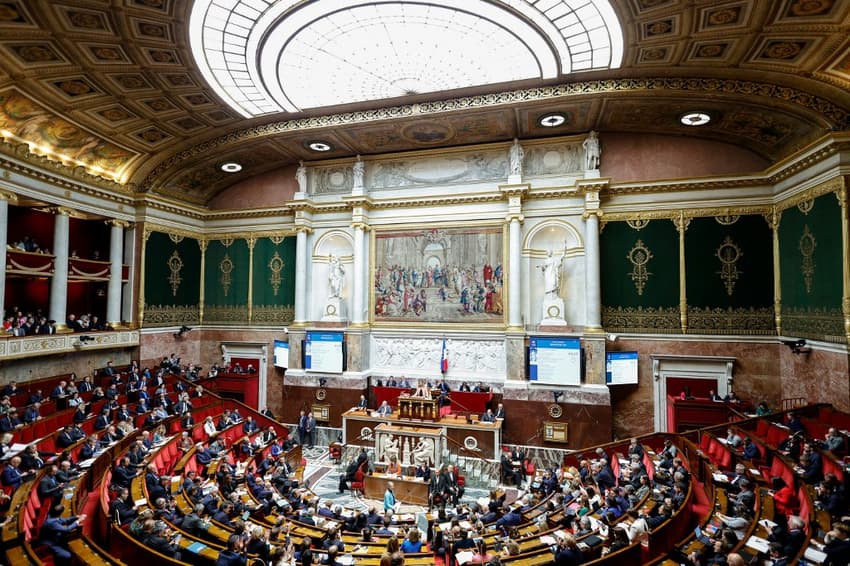French parliament calls on EU to list Wagner as 'terrorist group'

The French parliament has adopted a resolution calling on the European Union to formally label Russian mercenary force Wagner a "terrorist group".
The resolution, which is non-binding and symbolic, passed with unanimous support across the political spectrum.
Its author, ruling party MP Benjamin Haddad, has said he hopes it will encourage the 27 members of the EU to put Wagner on its official list of terrorist organisations.
"Wherever they work, Wagner members spread instability and violence," he told parliament on Tuesday. "They kill and torture. They massacre and pillage.
They intimidate and manipulate with almost total impunity."
He said they were not simple mercenaries driven by an "appetite for money" but they "follow a broad strategy, from Mali to Ukraine, of supporting the aggressive policies of President (Vladimir) Putin's regime towards our democracies."
Being listed as a terrorist group means EU members could freeze assets of the Wagner group and its members, while European companies and citizens are barred from dealing with the organisation.
But Wagner and its businessman leader Yevgeny Prigozhin have already been repeatedly sanctioned by the European Union, in February for human rights abuses in Africa and in April for participating in Russia's invasion of Ukraine.
Prigozhin had his assets in the European Union frozen in 2020 and was placed on a visa blacklist over the deployment of Wagner fighters to war-torn Libya, a decision he unsuccessfully appealed.
French Foreign Minister Catherine Colonna conceded to lawmakers on Tuesday that legally the EU terrorist label would not have any "direct supplemental effect" on the group.
But "we should not underestimate the symbolic importance of such a designation, nor the dissuasive effect that it could have on states tempted to turn" to Wagner, she said.
Prigozhin is a close ally of Putin, and his recruits have been fighting for months to capture the battle-scarred city of Bakhmut in eastern Ukraine.
Paris has blamed the group for running anti-French propaganda operations in west Africa, particularly Mali.
The EU's terrorist list, which is approved by leaders of the bloc's member states at their regular meetings, currently includes 13 people and 21 groups or entities including Al-Qaeda and the Islamic State group.
The parliaments of Lithuania and Estonia have also labelled Wagner a "terrorist organisation".
Comments
See Also
The resolution, which is non-binding and symbolic, passed with unanimous support across the political spectrum.
Its author, ruling party MP Benjamin Haddad, has said he hopes it will encourage the 27 members of the EU to put Wagner on its official list of terrorist organisations.
"Wherever they work, Wagner members spread instability and violence," he told parliament on Tuesday. "They kill and torture. They massacre and pillage.
They intimidate and manipulate with almost total impunity."
He said they were not simple mercenaries driven by an "appetite for money" but they "follow a broad strategy, from Mali to Ukraine, of supporting the aggressive policies of President (Vladimir) Putin's regime towards our democracies."
Being listed as a terrorist group means EU members could freeze assets of the Wagner group and its members, while European companies and citizens are barred from dealing with the organisation.
But Wagner and its businessman leader Yevgeny Prigozhin have already been repeatedly sanctioned by the European Union, in February for human rights abuses in Africa and in April for participating in Russia's invasion of Ukraine.
Prigozhin had his assets in the European Union frozen in 2020 and was placed on a visa blacklist over the deployment of Wagner fighters to war-torn Libya, a decision he unsuccessfully appealed.
French Foreign Minister Catherine Colonna conceded to lawmakers on Tuesday that legally the EU terrorist label would not have any "direct supplemental effect" on the group.
But "we should not underestimate the symbolic importance of such a designation, nor the dissuasive effect that it could have on states tempted to turn" to Wagner, she said.
Prigozhin is a close ally of Putin, and his recruits have been fighting for months to capture the battle-scarred city of Bakhmut in eastern Ukraine.
Paris has blamed the group for running anti-French propaganda operations in west Africa, particularly Mali.
The EU's terrorist list, which is approved by leaders of the bloc's member states at their regular meetings, currently includes 13 people and 21 groups or entities including Al-Qaeda and the Islamic State group.
The parliaments of Lithuania and Estonia have also labelled Wagner a "terrorist organisation".
Join the conversation in our comments section below. Share your own views and experience and if you have a question or suggestion for our journalists then email us at [email protected].
Please keep comments civil, constructive and on topic – and make sure to read our terms of use before getting involved.
Please log in here to leave a comment.